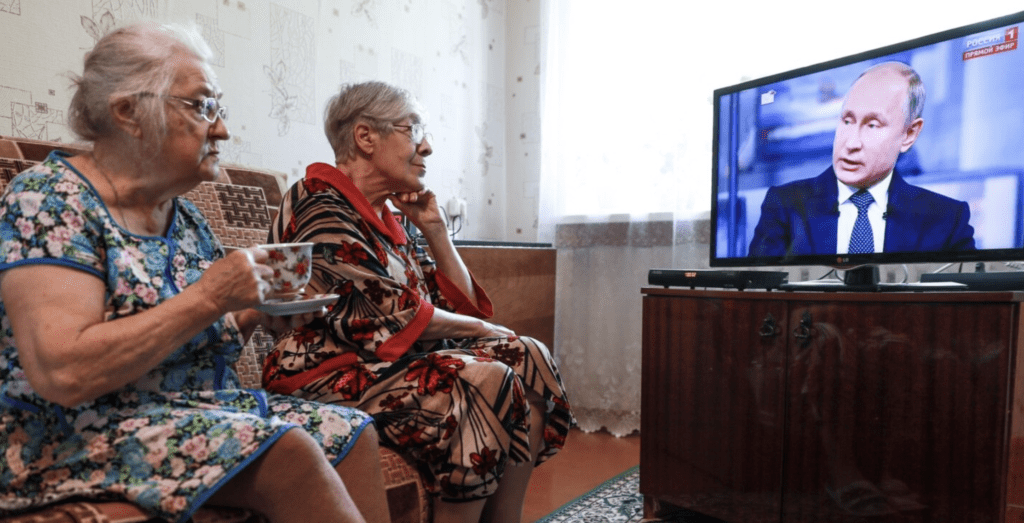Beyond Ukraine: A League of Lunacy Checklist
 Happier times: Russians watching Vladimir Putin long before the rant heard round the world/Tass
Happier times: Russians watching Vladimir Putin long before the rant heard round the world/Tass
Lisa Van Dusen
February 22, 2022
In the evolving spectacle of Vladimir Putin’s creeping assault on Ukraine, there are a number takeaways at stake for the aspiring new world order — or, to update the old Iran/Iraq/North Korea “Axis of Evil” tagline that seemed so hyperbolic in 2002 but now evokes a “those were the days” wistfulness — the League of Lunacy on whose behalf Putin is acting as proxy.
Putin’s war against Ukraine after weeks of what appears to have been catfish diplomacy on the part of the Napoleonic Russian president — launched by the rant heard round the world on Monday and greeted by sanctions from Western nations including Canada and the US — presents what distant analysts might call an inflection point and what Ukrainians and Russians might call a koshmar.
In this age of narrative warfare, in which events are operationalized to produce otherwise impossible outcomes, the “Westlessness” agenda of a war on democracy lubricated by corrupt intelligence interests, enabled by treasonous political players and previously fronted by China as the foremost geopolitical beneficiary of a new world order could be, the thinking apparently goes, significantly accelerated by a series of previously unthinkable reversals for the West.
At least for now, Russia has eclipsed China as the world’s leading geopolitical antagonist. The kinetic nature of Putin’s aggression against Ukraine and provocation against NATO, Europe, the United States and President Joe Biden as the most prominent pro-democracy leader in the world — especially in contrast to his Putinphiliac predecessor — re-sets the public perception of a two-decade covert attack and half-decade propaganda and narrative warfare assault on democracy as a less Orwellian, more conventional, hardware war.
Already, in some commentary quarters, this wholly manufactured crisis is being portrayed as a hubris competition between Putin and Biden, obscuring the crucial question of who started it and why
Until now, with notable regional exceptions, this conflict has been — through cyberwarfare, strategic corruption, ludicrous performative propaganda and other 21st-century innovations in domination tactics — a largely unattributed war on the existing, democracy-led world order. With the launch of a hot war in Europe as the most conspicuous front in the clash of existing-liberal and aspiring-totalitarian world orders, it has now been transposed to a 20th century-style, analog conflict narrative of daily geopolitical, political, diplomatic, military, economic and humanitarian developments whose outcome will be rationalized largely by questions of overt strategy rather than covert subterfuge.
Operationally speaking, the larger, aspiring-new-world-order goals in an engineered narrative for which Putin may prove to have been merely a catalyst (or, in the tactics and practices that brought us the Trump presidency, Brexit, January 6th and, to all appearances, the recent Canadian blockades; a weaponized assh**e) are not the seizure of Mariupol or Kyiv. They are, 1) The discrediting of a pro-democracy American president whose cannonballing via foreign policy failure could rationalize an organically preposterous re-capture of Congress by the anti-democracy Republicans in November, 2) The disempowering of a NATO whose status as a degradation target has been obvious since Donald Trump first hate-tweeted it, 3) The marginalization of diplomacy (a League of Lunacy weakness) by intractable thuggery (a League of Lunacy specialty), and, 4) The propaganda victory of a military defeat already framed as existential for a world order based on democracy, rule of law and human rights that has been systematically undermined from outside and in to the obvious detriment of truth, freedom, peace and human dignity.
Already, in some commentary quarters, this wholly manufactured war is being portrayed as a hubris competition between Putin and Biden, obscuring the crucial question of who started it and why, and touting as a bilateral personal feud what could be a humanitarian catastrophe for the people of Russia, Ukraine and beyond.
Lisa Van Dusen is associate editor of Policy Magazine. She was Washington columnist for the Ottawa Citizen and Sun Media, international writer for Peter Jennings at ABC News, and an editor at AP National in New York and UPI in Washington.
